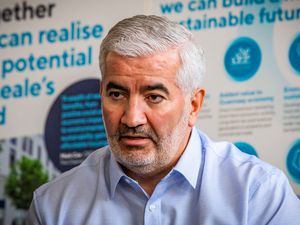‘AI could be a way of bridging the skills gap’
ARTIFICIAL INTELLIGENCE could bridge a productivity gap in the Channel Islands – and give the islands’ economies a boost.

Sebastian Burnside, the chief economist at the Royal Bank of Scotland, pictured, said growth in Western economies had been driven in recent years by getting more people into work.
However, the art of ‘getting more out of our workforces’ now needed to be rediscovered to ensure sustainable productivity growth. That was particularly important in the face of skills shortages in places like Guernsey, said Mr Burnside during a visit to island.
‘The most direct impact of weak productivity growth is the fact that pay in lots of places has struggled to keep pace with prices. That’s led to almost a decade-long squeeze on incomes,’ he said.
While it was good news that lots of jobs had been generated since the 2008 global financial crash, Mr Burnside added: ‘It’s now got to a stage where it is very hard to find people with the right skills to fill vacancies that businesses have.
‘So, it’s doubly important now that we rediscover that art of getting more out of our workforces and we change our mode of growth’.
Mr Burnside pointed to historic data showing that UK GDP had increased three-fold over the last 50 years, while the number of people in the economy had increased by just 20%.
The vast bulk of economic growth, he said, had come from people becoming two-and-a-half times more productive over that period of time.
‘That’s the critical element that has been missing from most of growth in the last decade. So, it’s really important for us to flick that switch and get back to higher productive growth mode.
‘This is where I believe AI can be a tremendous benefit and where I fundamentally am an optimist about this technology.’
AI appeared to be ‘uniquely targeted’ at being able to improve productivity whether that was through automating processes or augmenting a person’s ability to increase output.
‘AI and that sort of labour-reducing technology is exactly the type of medicine you would prescribe to an economy which has been struggling with low productivity growth,’ said the RBS chief economist.
Thanks to low unemployment, Mr Burnside said now was the ‘best possible starting place’ to think about AI and the inevitable challenges it will bring.
Supporting people through the transition, however, was vital amid the possibility of jobs changing or disappearing.
He also suggested a tranche of new well-paid jobs helping companies develop AI would be created, either through hiring external consultants or creation of internal teams. Money spent by these people would help drive wider economic growth.
‘There has been no technological revolution which has ended up with fewer people being employed at the end of it than there was at the start of it,’ added Mr Burnside, who stressed policy-makers should provide the right ‘conducive’ environment to support technological development.





